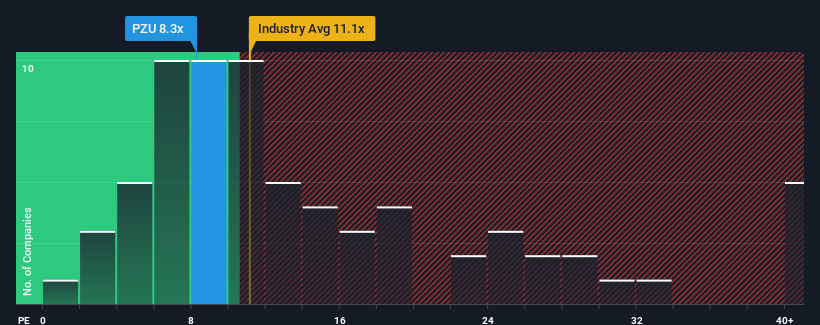Little Excitement Around Powszechny Zaklad Ubezpieczen SA's (WSE:PZU) Earnings

Powszechny Zaklad Ubezpieczen SA's (WSE:PZU) price-to-earnings (or "P/E") ratio of 8.3x might make it look like a buy right now compared to the market in Poland, where around half of the companies have P/E ratios above 13x and even P/E's above 28x are quite common. However, the P/E might be low for a reason and it requires further investigation to determine if it's justified.
Recent times have been advantageous for Powszechny Zaklad Ubezpieczen as its earnings have been rising faster than most other companies. One possibility is that the P/E is low because investors think this strong earnings performance might be less impressive moving forward. If not, then existing shareholders have reason to be quite optimistic about the future direction of the share price.
View our latest analysis for Powszechny Zaklad Ubezpieczen

Does Growth Match The Low P/E?
The only time you'd be truly comfortable seeing a P/E as low as Powszechny Zaklad Ubezpieczen's is when the company's growth is on track to lag the market.
Retrospectively, the last year delivered an exceptional 41% gain to the company's bottom line. Pleasingly, EPS has also lifted 132% in aggregate from three years ago, thanks to the last 12 months of growth. Accordingly, shareholders would have probably welcomed those medium-term rates of earnings growth.
Looking ahead now, EPS is anticipated to climb by 1.3% per annum during the coming three years according to the seven analysts following the company. With the market predicted to deliver 8.5% growth per annum, the company is positioned for a weaker earnings result.
With this information, we can see why Powszechny Zaklad Ubezpieczen is trading at a P/E lower than the market. It seems most investors are expecting to see limited future growth and are only willing to pay a reduced amount for the stock.
The Bottom Line On Powszechny Zaklad Ubezpieczen's P/E
Generally, our preference is to limit the use of the price-to-earnings ratio to establishing what the market thinks about the overall health of a company.
As we suspected, our examination of Powszechny Zaklad Ubezpieczen's analyst forecasts revealed that its inferior earnings outlook is contributing to its low P/E. At this stage investors feel the potential for an improvement in earnings isn't great enough to justify a higher P/E ratio. Unless these conditions improve, they will continue to form a barrier for the share price around these levels.
Don't forget that there may be other risks. For instance, we've identified 2 warning signs for Powszechny Zaklad Ubezpieczen (1 doesn't sit too well with us) you should be aware of.
Of course, you might also be able to find a better stock than Powszechny Zaklad Ubezpieczen. So you may wish to see this free collection of other companies that have reasonable P/E ratios and have grown earnings strongly.
If you're looking to trade Powszechny Zaklad Ubezpieczen, open an account with the lowest-cost platform trusted by professionals, Interactive Brokers.
With clients in over 200 countries and territories, and access to 160 markets, IBKR lets you trade stocks, options, futures, forex, bonds and funds from a single integrated account.
Enjoy no hidden fees, no account minimums, and FX conversion rates as low as 0.03%, far better than what most brokers offer.
Sponsored ContentNew: Manage All Your Stock Portfolios in One Place
We've created the ultimate portfolio companion for stock investors, and it's free.
• Connect an unlimited number of Portfolios and see your total in one currency
• Be alerted to new Warning Signs or Risks via email or mobile
• Track the Fair Value of your stocks
Have feedback on this article? Concerned about the content? Get in touch with us directly. Alternatively, email editorial-team (at) simplywallst.com.
This article by Simply Wall St is general in nature. We provide commentary based on historical data and analyst forecasts only using an unbiased methodology and our articles are not intended to be financial advice. It does not constitute a recommendation to buy or sell any stock, and does not take account of your objectives, or your financial situation. We aim to bring you long-term focused analysis driven by fundamental data. Note that our analysis may not factor in the latest price-sensitive company announcements or qualitative material. Simply Wall St has no position in any stocks mentioned.
About WSE:PZU
Powszechny Zaklad Ubezpieczen
Provides life and non-life insurance products and services in Poland, the Baltic States, and Ukraine.
Established dividend payer and good value.


